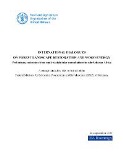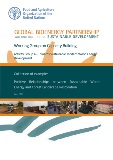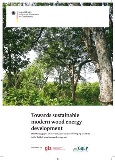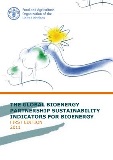Towards sustainable modern wood energy development

Wood remains the primary source of fuel for 2.3 billion people, but traditional woodfuel use can have negative impacts on the environment, as well as human health and livelihoods. To be sustainable, woodfuel needs to be responsibly sourced and processed to increase its efficiency and reduce its emissions.
The Activity Group on Sustainable modern wood energy development, led by FAO, promotes the adoption of sustainable management practices and efficient technologies for the production and use of modern wood energy and improved solid biofuels that can replace traditional energy forms, while reducing greenhouse gas emissions and pressure on forest resources.
The Activity Group is currently focusing on building concensus on carbon accounting for wood energy.
Related Publications

International dialogues on forest landscape restoration and wood energy
08/06/2020
This working paper focuses on the outcomes of three dialogues on wood energy and forest landscape restoration organized in Sub Saharan Africa (SSA) at International (Global Landscape Forum Accra 2019) and at National level (in Togo and Ghana) .

Positive relationships between sustainable wood energy and forest landscape restoration
06/06/2020
As a first step to highlight the important linkages between wood energy and forest landscape restoration, this collection presents examples from around of the world of projects, policies and approaches that aim to improve the sustainability of wood energy for a positive contribution to FLR. The collection includes country examples from Australia, Canada, Ghana, Lebanon, Kenya, Niger, Sri Lanka, Togo, USA and Zambia, as well as a regional example from SSA.

Towards sustainable modern wood energy development
12/12/2014
The report presents several successful practices that allow for an ecologically sustainable production of wood energy, with positive impacts on the incomes of rural populations in developing countries.

The Global Bioenergy Partnership Sustainability Indicators for bioenergy
12/12/2011
This report presents 24 indicators of sustainability regarding the production and use of modern bioenergy, to monitor and report on the environmental, social and economic aspects of sustainable development. The GBEP Sustainability Indicators (GSIs) are a relevant, practical, science-based tool that can inform policy-makers and other stakeholders in countries seeking to develop their bioenergy sector to help meet national goals of sustainable development.
Related videos
Webinar
Carbon accounting for wood energy: understanding wood energy data and model estimates
20/01/2024
Ensuring accurate data is essential for the responsible use of wood energy and maximizing its benefits. This webinar enhances our understanding of global...
Alternatives to woodfuel for restoring forests landscapes
18/04/2023
2.3 billion people globally rely on woodfuel as their primary energy source for cooking and heating, but its unsustainable use can drive deforestation. Finding...
Related news

Woodfuel alternatives can help restore forest landscape and benefit local communities
27/04/2023

From Restored Marginal Lands to Cooking Fuel – Links Between Wood Energy and Forest Restoration. Best Practices Presented During the 9th GBEP Bioenergy Week
16/11/2022
Related events
Bioenergy with carbon capture and storage: understanding the climate benefits
Virtual Event, 11/07/2024
Bioenergy with carbon capture and storage (BECCS) is a process by which biogenic CO2 from a bioenergy pathway is captured and stored, permanently removing it from the atmosphere. This webinar will look at the climate benefits of BECCS technologies and how they can be quantified.
Tenth Bioenergy Week
Bangkok (Thailand), Hybrid Event, 24/10/2023 - 27/10/2023
In 2023, the 10th Bioenergy Week focuses on sustainable bioenergy integration in food production chains, aiding the development of bioenergy policies in Asia-Pacific.
Webinar: Understanding wood energy data and model estimates
Virtual Event, 12/09/2023
This webinar aims to improve the understanding and explore the challenges regarding wood energy data at the global level, as well as showcase the general methods that can be used to estimate fuels used for household cooking.
Workshop: Carbon accounting and wood energy
Hybrid Event, 09/05/2023
The workshop aimed to support understanding of the various carbon accounting methodologies for wood energy, how they are applied in practice and policies, and the data requirements and gaps. The ultimate...
